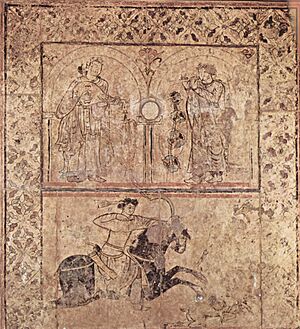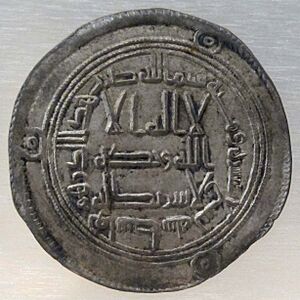Hisham ibn Abd al-Malik facts for kids
Quick facts for kids Hisham ibn Abd al-Malikهِشَام ابْن عَبْد الْمَلِك |
|||||
|---|---|---|---|---|---|
|
|||||
| 10th Caliph of the Umayyad Caliphate | |||||
| Reign | 26 January 724 – 6 February 743 | ||||
| Predecessor | Yazid II | ||||
| Successor | Al-Walid II | ||||
| Born | 691 Damascus, Syria, Umayyad Caliphate |
||||
| Died | 6 February 743 (aged 52) (6 Rabiʽ al-Thani 125 AH) Damascus, Syria, Umayyad Caliphate |
||||
| Spouse |
|
||||
| Issue |
|
||||
|
|||||
| Dynasty | Umayyad | ||||
| Father | Abd al-Malik | ||||
| Mother | A'isha, daughter of Hisham al-Makhzumi | ||||
| Religion | Islam | ||||
Hisham ibn Abd al-Malik was the tenth Caliph (ruler) of the Umayyad Caliphate. He ruled from 724 until his death in 743. His time as caliph was known for bringing back important reforms. He also helped the empire grow in arts and education.
Contents
Early Life of Hisham
Hisham was born around 691 in Damascus. This city was the capital of the Umayyad Caliphate. His father was Abd al-Malik, who was also a caliph. Hisham's mother was A'isha. She came from an important family in the Quraysh tribe.
Not much is known about Hisham's early years. He was too young to be involved in politics or wars. He once led the Hajj (pilgrimage) to Mecca. During this trip, he met a respected religious leader. Hisham also led a military trip against the Byzantine Empire in 706. He captured some of their forts.
Hisham hoped to become caliph after his brother Sulayman died. But Sulayman chose their cousin, Umar II, instead. Hisham disagreed at first but later accepted the decision. He did not hold any major roles under Umar or his brother Yazid II.
Hisham Becomes Caliph
How Hisham Became Ruler
When Caliph Yazid II was dying, he chose Hisham as his successor. This was suggested by their brother, Maslama. Hisham became caliph in January 724 after Yazid's death. He received the news at his desert home. Then he traveled to Damascus. There, he was publicly recognized as the new caliph.
Hisham's Rule and Reforms
Hisham took over an empire with many challenges. But he was very good at handling them. His long rule helped the Umayyad empire stay strong. He brought back many good changes that were started by Caliph Umar II.
Hisham loved and supported the arts. He encouraged artists throughout the empire. He also helped education grow by building more schools. He made sure many important books were translated into Arabic. Hisham also made sure that Sharia (Islamic law) was followed strictly. He even applied these rules to his own family. This strictness helped him succeed as a leader.
Hisham also asked a famous scholar, Ibn Shihab al-Zuhri, to write down the hadith. These are sayings and actions of the Prophet Muhammad.
Military Actions Under Hisham
Hisham's empire faced some tough battles. They had setbacks in the Caucasus against the Khazars. They also struggled in Transoxiana against the Turgesh. Hisham sent armies to stop a rebellion in Sind (part of India). They succeeded in bringing those areas back under control.
The Umayyad armies continued their regular raids against the Byzantine Empire. Hisham's half-brother, Maslama, was a strong commander. He fought the Byzantines in 725–726 and captured a city called Caesarea Mazaca. Maslama also fought the Khazars and defeated them. Hisham's son, Mu'awiya, also led many raids. He captured several forts in Byzantine lands.
In North Africa, a big revolt happened. It was led by the Berber people. In 740, a large Berber army defeated a loyal army. Hisham sent a new force of 27,000 soldiers. But this army was also defeated in 741. Finally, a commander named Handhala ibn Safwan managed to defeat the Berbers. He brought the region back under Umayyad control.
Hisham also faced a revolt led by Zayd ibn Ali. Zayd was a grandson of Husayn bin Ali. People in Kufa encouraged Zayd to revolt. The governor of Iraq found out about the plan. Zayd fought his way to the main mosque. He pushed back the governor's troops but was hit by an arrow. The revolt was put down.
In Spain, Hisham's governor, Abd al-Rahman ibn Abdallah, gathered a large army. This army went into France. They reached the Loire river. This was the furthest the Arab armies went into Western Europe. Their advance was stopped at the famous Battle of Tours by Charles Martel.
Death and Legacy
Hisham died on February 6, 743. His son, Maslama, led the funeral prayers. Hisham had tried to make Maslama his successor. But his nephew, Al-Walid II, was chosen instead. Al-Walid II became the next caliph.
Historians generally see Hisham's rule as very successful. It is often compared to the reigns of earlier strong caliphs like Mu'awiya I and Abd al-Malik. His time as ruler was seen as a period of growth and success for the Umayyad Caliphate. Many historians believe Hisham's hard work and careful management kept the empire strong. They often blame his successor and other issues for the empire's problems after Hisham's death.
Hisham is remembered as a careful and effective leader. He was known for being strict but fair. The Umayyad state was very strong under his leadership.
Family Life
Hisham's main wife was Umm Hakim. She was known for her beauty. She had five sons with Hisham, including Sulayman, Maslama, and Mu'awiya. Hisham also had other wives and children. His daughter, A'isha, was given an estate by him.



